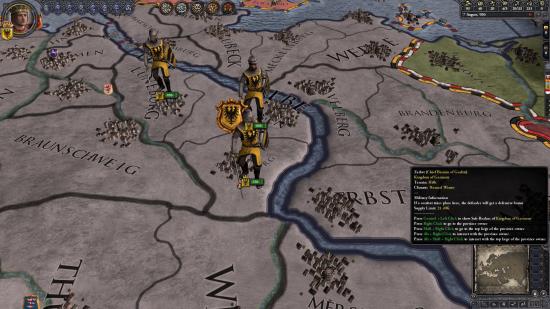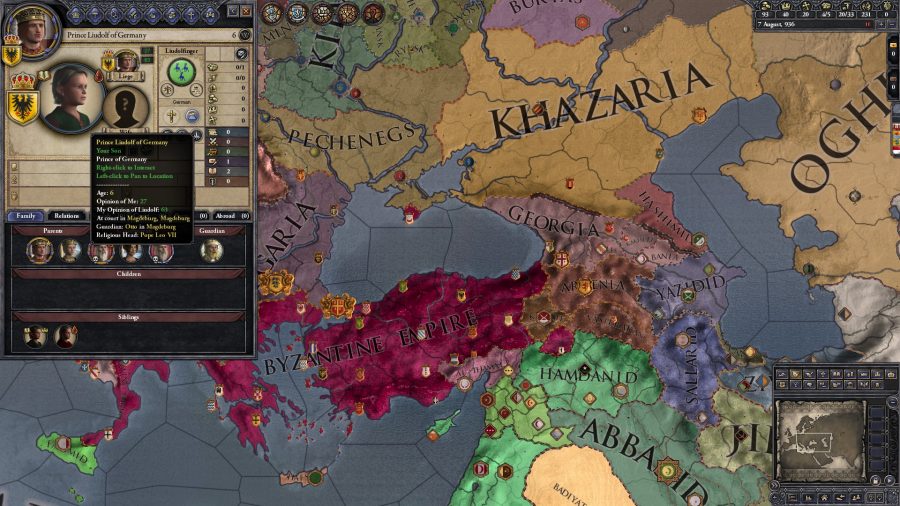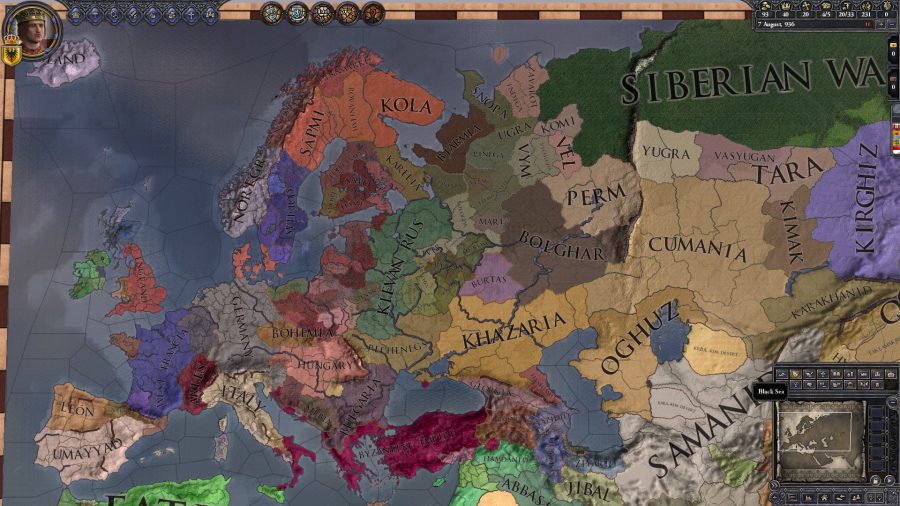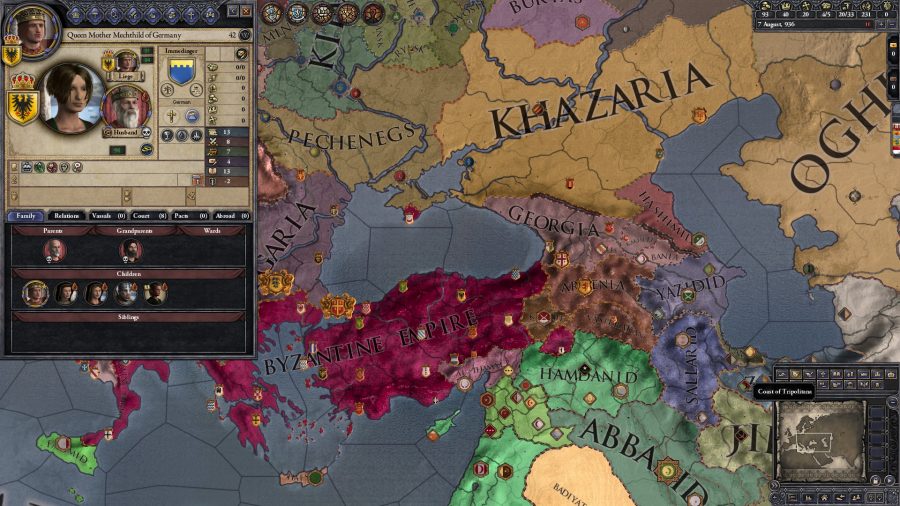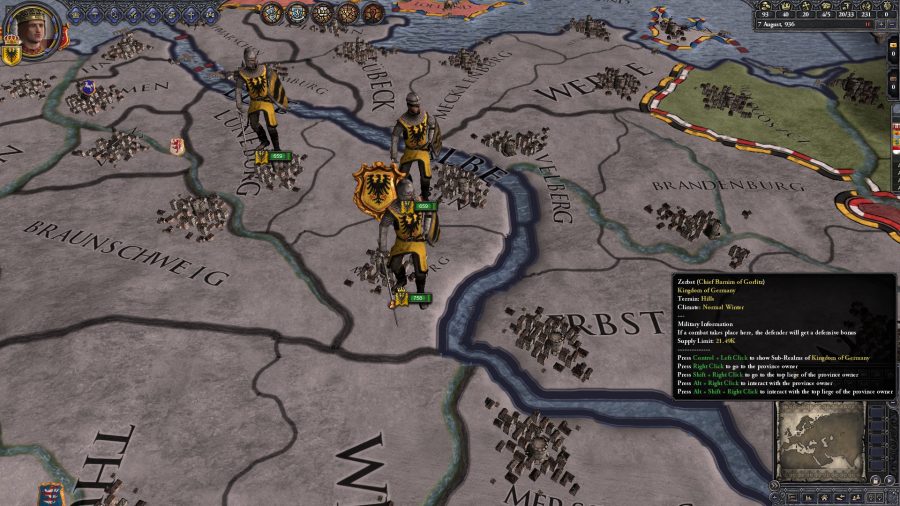Out of all of Paradox’s grand strategy games, I dare to say that Crusader Kings II is the most unique. Essentially character based, it simulates the interpersonal nature of politics in the Middle Ages before the advent of nation-states. The sweeping, human narratives and dramatic turns blur the line between RPG and strategy without ever losing its ‘grand’ pedigree. To be truly successful in this game requires more than just careful logistical planning of troops and supplies: it also requires navigating the trials of courtly life.
Not long after Crusader Kings 3 was first announced, CK2’s base game was made free for everyone. That means there’s could be loads of new wannabe rulers needing advice on how to navigate this titan of a strategy game, and we’re here to help.
To that end, my liege, whether you’re a new count or a battle-scarred crusader king, allow me to offer some of the most important tips for the novice and veteran alike. All the advice below is correct as of the most recent patch with all expansions.
SUCCESSION YOUR WAY TO SUCCESS
Unlike other games both in Paradox’s stable and outside of it which tie your fate to a nation, in CKII, your fate is tied to a particular dynasty—and, more specifically, to one person at a time in that dynasty. Thus, even if your great nation controls the known world but your family loses control over any lands, it’s “Game over, man. Game over.”
Securing that your titles are succeeded by someone in your family becomes your most primal concern at the start of the game and securing that your family succeeds to titles as it grows is one of the best strategies to “peacefully” acquire more control. This is especially important if you’re starting a custom character which has no dynasty to rely on.
Related: The best Crusader Kings 2 mods
Most of the time, accomplishing this task is simple: get married (make sure it’s matrilineal if you’re a woman), have children, and sit pretty as you hope your children aren’t idiots. However, here are some nuances:
- Make sure your spouse loves you. Lavish him or her with gifts and other favours that will entice them to your side. This not only mechanically improves your chances of conceiving, but it also helps to ensure that you are not a poor cuckold.
- There’s no real harm in Family focus for a longer period while you wait for heirs. The diplomacy bonus to it is significant enough to be a good focus in and of itself while helping you to conceive children.
- Don’t be afraid to annul marriages that are barren. If you can get your religious head to be on your side to grant you an annulment, do not hesitate. After all, how can a realm breathe with no heir? Just be aware that divorcing your spouse will enrage their family against you. The only exception is if you’re hoping to get a claim on your spouse’s demesnes.
Finally, and perhaps most ‘importantly’, change succession laws. Gavelkind is perhaps the worst possible succession law ever invented by man. Cutting up one’s realm between one’s heirs is not only detrimental for larger realms that might split into various Kingdoms (and basically set back all the work you’ve done), but it might cause rivalries between children. Which leads us to our next major tip…
ELECTIVE MONARCHY ISN’T SO BAD
So long as you can control the majority of the electors through diplomacy or intrigue, Elective Monarchy almost always ensures that you select the best possible heir for your realm. Whether it’s pure elective monarchy or the Imperial style of elective, I have found that this succession law helps to select not only well qualified rulers based on stats and traits (while avoiding those inbreds, of course), but also grants you the ability to choose young rulers which is essential for building up that long term legacy. Realms are often unstable after a new ruler ascends and Elective Succession Law helps to alleviate this concern by choosing younger candidates who reign far longer on average.
Related: Read our complete CK2 DLC guide
The game is all about building and cultivating loyalty and leading through awe rather than mere power. This is the radial ideal of Medieval Imperial ambition. The problem, of course, is that Elective Monarchy is high risk high reward. You will want to actively kill, exile, or otherwise bribe electors who don’t support your candidate or ‘eliminate’ your rivals that aren’t your ideal candidate. However, keep in mind that you don’t need to worry so much if it’s another family member that is being favoured. So long as your dynasty is on the throne, that’s sufficient and the electors will never pick someone so bad that you’ll immediately be beset by civil war. Don’t be too hung up if your ideal heir is not selected so long as he’s of your blood.
INDEPENDENCE IS OVERRATED; CONQUER FROM WITHIN
Sun Tzu said that to defeat your enemy through great strength is not the onus of Supreme Excellence; Supreme Excellence is to defeat your enemy without lifting a finger. Thus, learn how to ‘politic’ your way to power.
Perhaps the best way to explain this tip is to give you an example from one of my playthrough: I started as a lowly count of Santiago who managed to wrest control of the Kingdom of Asturias. Unfortunately, the Muslim neighbours to the south were poised to destroy my tiny Kingdom. Instead, as soon as I had control of the crown, I bent the knee to Charlemagne who was all too happy to be my overlord. The Caliphate to the south would not dare entrench themselves in a war against a whole empire so I was safe to scheme from within. Since I was already a Kingdom with various demesnes, I was one of the most powerful vassals of the Emperor and set to work befriending enough nobles in the Empire to be crowned Emperor not too long after.
If I had remained independent, I would have had no hope against the Caliphate to the South and the Empire to the North. Instead, by working from within, I was crowned by the Pope. Not too bad for a lowly Count to accomplish in the span of twenty years. Which leads us to our next tip.
TARGET CHARACTERS, NOT INSTITUTIONS
You don’t need to win over everyone. Simply win over the appropriate people to get your job accomplished. For example, if you need someone dead, befriend their spymaster. If you need someone deposed, befriend the most powerful vassals in the Kingdom. Focus on quality of characters rather than quantity. Focus your money on those who have influence and focus your military forces on those who are weak and you will find yourself rising to the heights of power.
Related: The best strategy games on PC
Learn how to eliminate your rivals and to be selective about who you place in power even if they have great stats. Which dovetails nicely into one of the most important parts about managing your court.
CKII IS AN ARTIFICIAL EVOLUTION CHAMBER
Like learning how to breed beautiful flowers, playing CKII also invites the player to generate genetically favourable traits. Unlike some traits which are based on personality and experience (like the virtues and vices), some traits are genetic. These include Genius, Tall, Strong etc. If possible, learn how to consistently include these genetic markers into your family line.
This hoarding also applies to Bloodlines. Avoid bad traits and bolster good traits. Always avoid detrimental genetic traits like inbred, but, keep in mind, that choosing between a spouse that might be great genetically and one who has no negatives but is the heir or heiress to a title, it’s almost always better to choose to pursue the title to expand your realm. Once you have control of most of the realms of your religion, that’s when you can focus on genetic supremacy.
SOMETIMES, REBELLION IS A GOOD THING
Strange, you might say. Yet, I have often intentionally triggered civil wars for myself. Why? If you can be sure of winning a civil war by inciting a faction against yourself, you can actually eliminate the power base of rival dynasties. Whenever you win against a faction or vassal in a war, you can strip their members of one or two titles without suffering penalties and, thus, install one of your loyalists (preferably family members) in their place. This is especially useful if you’re looking to replace cultures.
Learn how to properly prune out factions in your realm by targeting opponents and inciting them to rebellion by getting reasons to arrest them and attempting to arrest them with an intentionally low chance of success forcing them to raise arms against you. This is also a great way to accelerate cultural assimilation as you can choose a top tier vassal of your culture to lead the new viceroyalty or duchy.
Keep in mind that you can also raise your levies and position them in their demesnes even before you send out the arrest order so you can have a huge mobilisation advantage over your opponent right in the beginning.
WINNING WARS IS SIMPLER THAN YOU THINK
Unlike other Paradox titles which require you to strategically deploy troops against fortresses and achieve wargoals, CKII rewards a player for winning decisive engagements. Huge amounts of ‘warscore’ is awarded if you manage to defeat an enemy ‘doomstack’ (their combined armies in one location): sometimes by as much as fifty percent. By capturing only one castle and squashing the rest of the armies, you could sometimes force a peace. Thus, with no fortresses to get in the way of mobilisation, squash the enemy army first, attain a massive advantage in warscore, then while the enemy army is trying to regroup, capture enough castles to force a peace. Take note that you ought not pursue an enemy army too far into enemy territory as attrition will kill you. Wait until the doomstack is visible and then pursue it on your territory.
This is, of course, assuming you can defeat the enemy army. Thus, target opponents weaker than you are. It’s easy to check by looking at their ruler and seeing how many levies they can raise in their character profile. Usually, most armies are equivalent in strength so determining by numbers is easy enough. Avoid fighting those with similar sized armies if you can help it since chance may easily turn your parity into a route. Almost always fight those significantly weaker.
If you can’t find someone significantly weaker, either wait until they are involved in another war with a powerful opponent, raise religious levies against them if they’re of another religion, or build up a massive war chest to employ mercenaries. Mercenaries are more unforgiving in CKII than in most other Paradox games so be careful.
The only exception to these tips is for fighting the ‘bosses’ such as the Mongol Hordes, Aztec Invaders, and China. These entities with their special ‘event troops’ don’t suffer attrition and are generally of higher quality troops. Defeating them is the true test of a crusader king and requires careful planning and preparation.
CK2 START DATES
Crusader Kings II can see a player starting off at many points over its 700+ year timespan, on one end with a Europe still seeking to find solid ground after the fall of the Western Roman Empire, and on the other with recognisable power players that would dominate the globe for the next 500 years. With 11 different start dates to choose from, the choice can be daunting for even an experienced CKII player. We’ll give you a quick rundown of what each of the start dates are like, plus point you to interesting areas to jump into.
EARLY MIDDLE AGES (1 JANUARY, 769)
The earliest start date is by far the most diverse in terms of tech and religion. Europe is divided between feudal and tribal states, with many of the tribes also being pagan. This presents an interesting dichotomy, as many early feudal states will have access to heavier and better tech troops, but tribal governments can call in vast numbers of men to fight. Similarly, the presence of the Germanic and Slavic religions in Europe changes the dynamic of diplomacy. You cannot count on another European liking you, because you may be the wrong religion. Expect many religious wars and Viking raids, as well as expansion from the Eurasian Steppe hordes. The Chinese also have a strong hand in this start, with their influence slowly reaching west.
Suggested Regions: Western Scandinavia, Iberian peninsula, Himalayas, Caucuses
VIKING AGE (1 JANUARY, 867)
Catholicism and feudalism have spread eastward in Europe, in large part thanks to the successor kingdoms to Charlemagne’s Francias. However, even with Christianity strengthened, Germanic Viking hordes are on the loose in Northern Europe. While still tribal, they have such large numbers that they are almost impossible to initially defeat. The nomads of the Eurasian Steppe still pose a threat to their neighbours, but especially as the previous large regional power, the Abbasids, have lost much ground since the previous start.
Suggested Regions: Iberian peninsula, British Isles, Southeastern Europe, India
THE IRON CENTURY (7 AUGUST, 936)
Feudalism gained ground in Western Europe and lost ground in the east, but Catholicism has seen a large spread over the previous 70 years, with most of Europe (excepting much of the Iberian Peninsula, of course) now being Christian. This is a new starting point, recently delivered as free DLC, and it centres around the Germans setting out a-conquering in Central Europe. The previously fearsome Abbasids have meanwhile fallen from grace, and the new power in the MENA (Middle East and North Africa) region is the Fatimid Empire, who look to expand into former Abbasid territory.
Suggested Regions: Central Europe, Western Scandinavia, North Africa, Eastern Europe, Central Asia
HIGH MIDDLE AGES (15 SEPTEMBER, 1066)
This is the classic starting point; Europe is defined less by a variety of government types and religions, and more by many large realms that are uniformly feudal and Catholic (as always, of course, excepting the Iberian peninsula, and also Eastern Europe). This start is very close to the following start, the main difference being that this start features the 3-way war for England between the Anglo-Saxons, the Norwegians, and the Normans. Elsewhere, the Byzantines continue to be the centre of technological innovation, but are faced by the Seljuk Sultanate, who separate the west from the east.
Suggested Regions: England, Southeastern Europe, Northern Europe
WILLIAM THE CONQUEROR (26 DECEMBER, 1066)
Fast forward 3 months, and England is now being run by Normans. Not too much else has changed (it has been only 3 months), but players should also look to the Iberian Peninsula if they miss the good religious and cultural conflicts between realms of the earlier starts. Similarly, India in general is a great place if you are looking for extra-realm conflict, with several large and powerful kingdoms packed into a tight box. However, if backdoor scheming and trickery is more your style, there are plenty of options for inter-realm mischief in large European powers, such as the Holy Roman Empire.
Suggested Regions: England, Iberian Peninsula, India
THE ALEXIAD (1 APRIL, 1081)
The mighty Byzantines have begun their historical fall from grace, with the Sultanate of Rum seizing much of Anatolia from the Byzantines. The Seljuks have also begun expanding north, east of the Caspian Sea. And while the Germanic, Slavic, and to an extent the Romuva religions have been reduced in Eastern Europe, a great amount of Northern European tribes still follow the Suomenusko faith, butting up against the Orthodox Kievan Rus and Novgorod.
Suggested Regions: Southeastern Europe, Northeastern Europe
THE THIRD CRUSADE (1 JANUARY, 1187)
Forces from the 3 great Catholic realms from Western Europe (England, France, and the Holy Roman Empire) are marching east in a Crusade to fight off the Ayyubid Sultanate from Jerusalem. This is a great start if you like participating in Holy Wars, as one is served up and ready to go right from the start. Also to note is that England owns a decent chunk of France now, leading to much conflict in the coming years.
Suggested Regions: Western Europe, Western Middle East
THE LATIN EMPIRE (16 MAY, 1204)
The Fourth Crusade failed after it was derailed by a convoluted series of events, resulting in the sack of Constantinople, and the creation of 2 new empires from the ashes of the Byzantine Empire. The Latin Empire sits on the west of the Bosporus Strait, with the Nicene Empire occupying the east. Both are relatively much weaker than the Byzantines were, so there is a power vacuum in the area to fill, either from the 2 new empires, or from a nearby upstart. Of note, the Khwarezmid Sultanate have burst onto the scene in Central Asia, neighboring the now huge Ghurid Empire in India.
Suggested Regions: Southeastern Europe, Central Asia
AGE OF THE MONGOLS (1 FEBRUARY, 1220)
The Mongols have entered the picture, with huge event-spawned stacks appearing at the eastern edge of the map. At the start, they are poised to cut a bloody path through the Khwarezmid Sultanate and much of Eastern Europe. This is a good start for those who love figuring out how to handle a great crisis that can leave you subjugated or dead very quickly, if you are in the Mongols’ way.
Suggested Regions: Central Asia, Middle East, Eastern Europe
RISE OF THE HANSA (1 MAY, 1241)
The Mongols, now split into the Golden Horde, the Ilkhanate, and the Khaganate of Mongolia, have lost their forward steam, but have expanded vastly over the previous 21 years. Bulgaria, Hungary, and Novgorod face subjugation, as well as the Sultanate of Rum and the Ayyubid Sultanate to the south. Meanwhile, further to the east, Delhi stands in a good position to take over India as a whole if they so choose. And back west in Germany, the Hanseatic League is being formed by Lübeck and Hamburg. For the east of Europe, this is what a post-apocalypse scenario looks like.
Suggested Regions: Eastern Europe, Southeastern Europe, Middle East, Germany
LATE MIDDLE AGES (1 JANUARY, 1337)
The final start date in Crusader Kings 2, much has changed since the last start date. This is an excellent start for those who wish to continue their game into EU4, as there are only about 100 years between 1337 and the end date of the game. In the north of Europe, Novgorod and Sweden have become dominant regional powers, both threatened by the still dangerous Golden Horde. France and England are set to begin a very long series of wars with each other, and in the Iberian peninsula, Castille, Aragon, and Portugal have emerged, but there is still a Moorish influence on the southern end. In Anatolia, The Byzantines have reformed from the ashes of the Latin and Nicene Empires, but the Ottomans have also appeared, ready to seize prominence. The Bahri Sultanate is the newest power in the Middle East, but they are still threatened, much like Northern Europe, by the Ilkhanate. Finally, in India, the Tughluq Khaganate is in control of much of the subcontinent, but the Yuan and the Ilkhanate are both in a prime position to threaten the Tughluq.
Suggested Regions: Western Europe, Northern Europe, Eastern Europe, Middle East, India
More like this: The best 4X games on PC
Hopefully, these should have you well on your way to creating and empire and dynasty to echo through the ages. Or, head on over to our Crusader Kings 3 beginners guide and review, If you’re new to the Crusader Kings series and still haven’t decided which one you’d like to start with.
